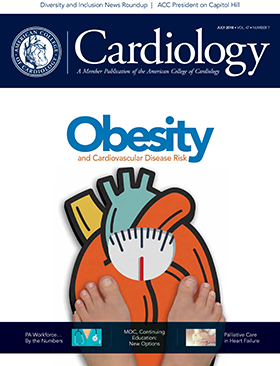Innovation at ACC | Innovations That Refine Clinical Practice

Developing groundbreaking technology and programs to improve cardiovascular care can be a challenging path to navigate. The ACC partnered with AngelMD to develop the Innovation Challenge, first held at ACC.18, to help startups move their products closer to the marketplace to meet the overall mission of transforming cardiovascular care and improving heart health.
The Innovation Challenge featured eight finalists selected from 64 applicants in the categories of medical devices and digital health. This is the third of four installments in our series telling the story of each finalist and the products they are developing to improve clinical care through innovation.
Wearing an Apple Device Everyday Keeps the Doctor Away
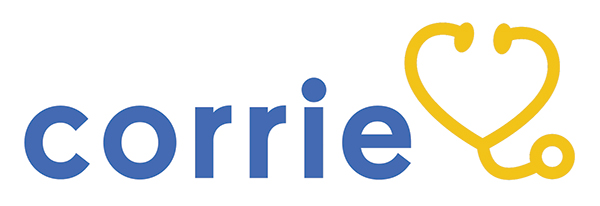
The best way to enlist an audience's attention is to have it eager to experience something new and eliminate distractions. Corrie Health takes this approach even further with a user-friendly approach to educate patients immediately after their myocardial infarction (MI). While hospitalized and recovering, they begin to learn about the causes of MI, planned treatments and the need to lead healthier lifestyles.
Corrie Health is a smart hospital-discharge platform that engages patients in their own care through an Apple watch, Bluetooth blood pressure monitor and interactive app early in their hospitalization, giving them time to prepare for discharge and gain skills for the transition to home and thus reduce hospital readmission.
Patients use the Corrie platform for at least 30 days to view state-of-the-art videos and animations and other presentations with information about antiplatelet, blood pressure and cholesterol medications; how their stents function; smoking cessation; diet; and how to lead healthier lifestyles. The Corrie platform includes an electronic wallet so patients and their caretakers have insurance information, medical records and provider information all in one place. Read More >>>
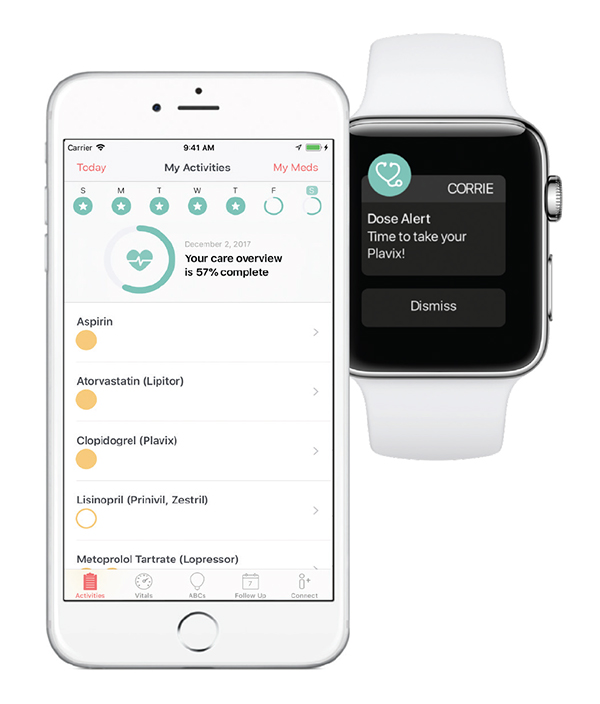
The average patient spends five days in the hospital following an MI. Corrie Health takes aim at these patients with a new, immediate approach rather than handing them stacks of written information only at discharge, says Seth Martin, MD, MHS, FACC, Corrie Health's chief medical and scientific officer.
"We're striving to connect with patients as early as possible in their recovery to put the tools for optimal heart attack recovery literally at their fingertips," Martin says. "We want to take complete advantage of the hospital stay to move our patients from informed to engaged to activated in their care."
The approach appears effective and may lower costs, says Francoise Marvel, MD, Corrie Health CEO.
An analysis of the treatment of 80 patients using the Corrie platform shows they are 60 percent less likely to be readmitted to the hospital within 30 days compared with patients not in the program. Only 6 percent of Corrie patients were readmitted in 30 days, and none of those readmissions were related to cardiac issues, she says. The cost of readmission is more than $42,000 per patient, including penalties a hospital may face for exceeding readmission goals.
"The cost of an iPhone or a smartwatch is a drop in the bucket compared to the penalties," Martin says.
In addition, the Centers for Medicare and Medicaid Services has approved a CPT code, which allows for reimbursement of digital monitoring of health, Marvel says. Insurance companies see the benefits of monitoring, with Aetna now providing smartwatches to their insured members to monitor their own health.
"We want to take complete advantage of the hospital stay to move our patients from informed to engaged to activated in their care." — Seth Martin, MD, MHS, FACC
The Corrie Health smart hospital-discharge platform was developed about three years ago at The Johns Hopkins Hospital in Baltimore, MD. As a resident there, Marvel partnered with an engineer and business consultant to develop a prototype, and the team then partnered with Martin, engineers (led by Matthias Lee), Apple professionals and Nucleus Media to create an enhanced and functional version of Corrie.
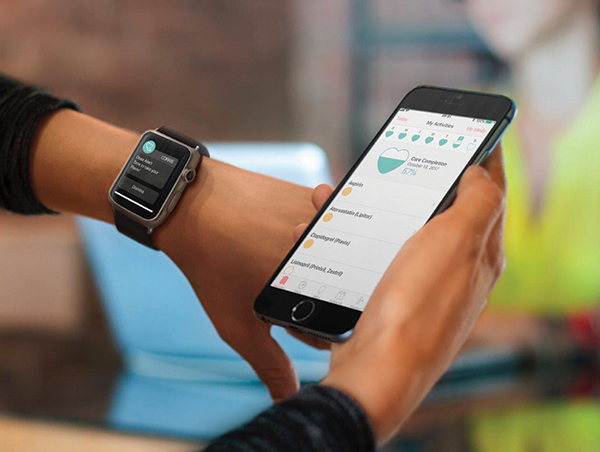
More than 100 patients now have participated in the program. Some already owned Apple devices while others were provided the Apple equipment for 30 days through the iShare program. iShare promotes health equity by lending devices to patients who are traditionally underserved, Martin states.
The next step for Corrie Health is to commercialize the program and expand it to address other conditions and hospitals. It has been rolled out at Massachusetts General Hospital in Boston, MA, and at Reading Hospital in Reading, PA.
"We are looking to expand our commercial partnerships to accelerate our growth and help more patients," Marvel says. "We want to engage patients and partner with hospitals and insurance companies to improve care. Being part of the Innovation Challenge helped create exposure for Corrie Health and create interest with other hospitals."
Making Existing Technology More Practical

Magnetocardiography, also known as MCG, is an established but complex technology that has been refined to quickly detect coronary artery disease. Genetesis Inc. has developed the CardioFlux Magnetocardiograph, a device that passively detects the magnetic field naturally generated by the heart. The field produces the same electric currents that generate an ECG signal. CardioFlux, though, detects a signal that is not distorted by the body's conductive tissue.
CardioFlux is more clinically practical and helps physicians make diagnostic decisions for patients suspected of having heart disease. "In a clinical trial, we demonstrated CardioFlux's high negative predictive value in patients with low- or intermediate-risk chest pain," says Peeyush Shrivastava, Genetesis CEO. In other words, the technology is very good at identifying the absence of coronary artery disease. "You can distinguish cardiac- vs. noncardiac-origin chest pain very quickly," he adds. This has tremendous potential in the emergency department, where it can assist with rapid and accurate assessment of chest pain. Read More >>>
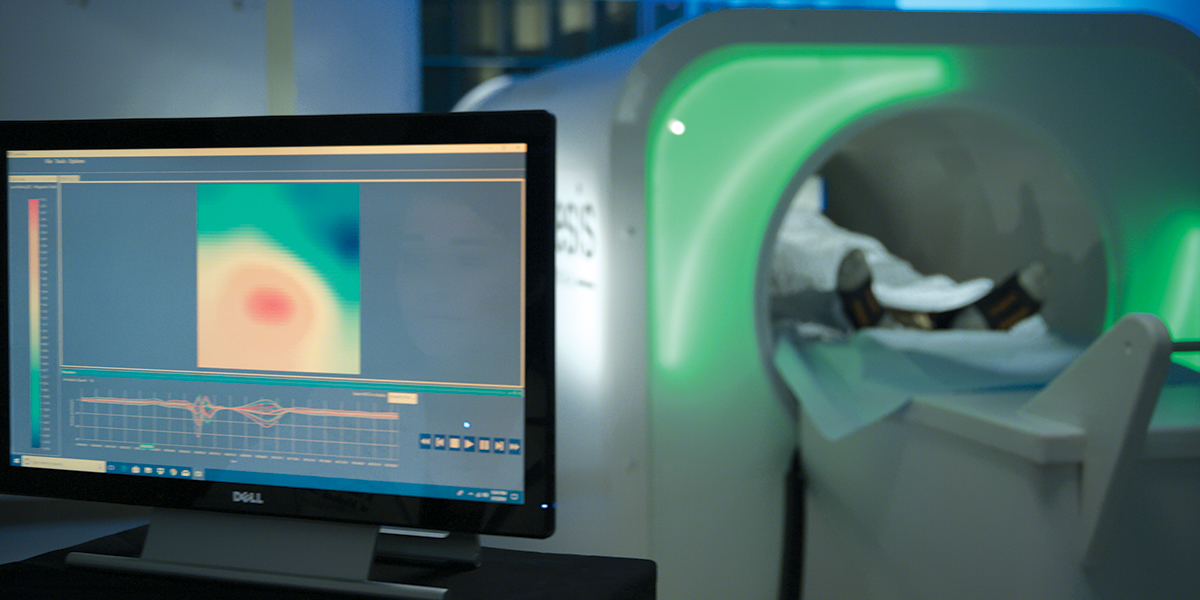
CardioFlux, first built in 2016, looks like an MRI scanner, but is less expensive, lighter and does not require the same unique infrastructure, such as liquid helium cooling or a magnetically shielded room. It does not require any room modifications, customized power or ventilation.
The CardioFlux device has two major components. One component is a large chamber that makes it look like an MRI scanner and serves as the magnetic shield. The second component is a device with sensors used to detect and measure the heart's magnetic field. The MCG uses materials, software and processes to create a stable environment needed for the sensitive measurements, Shrivastava says.
Extensive training is not needed to use the Cardioflux MCG. A technician or nurse can perform the 90-second scan, which requires just a few minutes to set up. Because cardiologists and attending physicians have extensive experience at reading ECG data, they can quickly learn to read the MCG data because it stems from the same electrophysiology. Immediately after a scan is completed, the data can be transmitted and processed, and a report can be downloaded electronically.
Magnetocardiography has been studied for 45 years and it has been found to be sensitive for detecting information missed during ECGs or more invasive technologies, such as nuclear stress testing, Shrivastava says. Its drawback was that it was cumbersome, so it was not commonly used. Genetesis founders became familiar with the technology by seeing a parallel when scientists attempted to identify disease currents in isolated heart cells.
"In a clinical trial, we demonstrated CardioFlux's high negative predictive value in patients with low- or intermediate-risk chest pain." — Peeyush Shrivastava
"It was the basic science gold standard for electrophysiology," he says. "In the clinical world, physicians did not have anything as good for clinical decision support. Our team wanted to develop a technology that could translate basic science knowledge to the clinical world. The best method to do that was to perfect magnetocardiography, which has really become a promising solution to bridge this gap."
The team started by designing technology to map irregular heart rhythms and Genetesis was formed in 2013. Their first CardioFlux system was built in 2016. The company expects the device to receive Food and Drug Administration clearance by early next year, and if so, plans to make the CardioFlux available commercially in 2019. The CardioFlux has been through two clinical trials, and later this year a CardioFlux device will be installed at three different institutions.
The CardioFlux could help reduce costs by eliminating inappropriate tests to evaluate chest pain and reducing the length of hospital stays, Shrivastava says, adding that ACC's Innovation Challenge helped Genetesis establish itself in the cardiology world as an innovator.
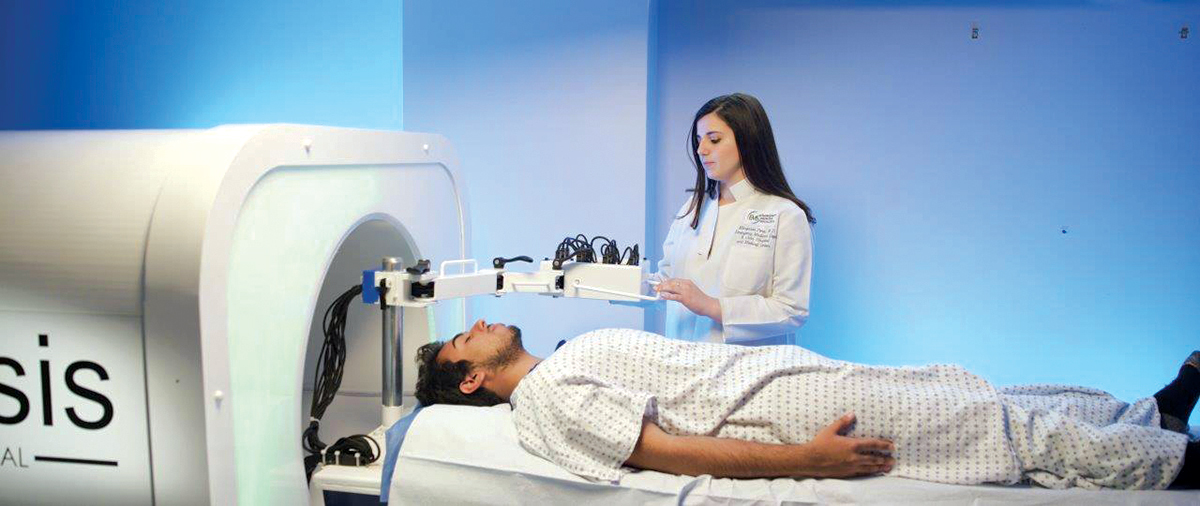
Clinical Topics: Arrhythmias and Clinical EP, Cardiovascular Care Team, Dyslipidemia, Invasive Cardiovascular Angiography and Intervention, Noninvasive Imaging, Prevention, Atherosclerotic Disease (CAD/PAD), Implantable Devices, SCD/Ventricular Arrhythmias, Atrial Fibrillation/Supraventricular Arrhythmias, Lipid Metabolism, Nonstatins, Interventions and Coronary Artery Disease, Interventions and Imaging, Magnetic Resonance Imaging, Diet
Keywords: ACC Publications, Cardiology Magazine, ACC18, ACC Annual Scientific Session, Blood Pressure, Blood Pressure Monitors, Centers for Medicare and Medicaid Services, U.S., Chest Pain, Cholesterol, Consultants, Coronary Artery Disease, Current Procedural Terminology, Decision Support Systems, Clinical, Diet, Electrocardiography, Electrophysiology, Emergency Service, Hospital, Heart, Heart Diseases, Hospitals, General, Length of Stay, Life Style, Magnetic Fields, Magnetic Resonance Imaging, Magnetocardiography, Malus, Medicaid, Medical Records, Medicare, Myocardial Infarction, Patient Discharge, Patient Readmission, Smoking Cessation, Software, Stents, United States Food and Drug Administration
< Back to Listings


